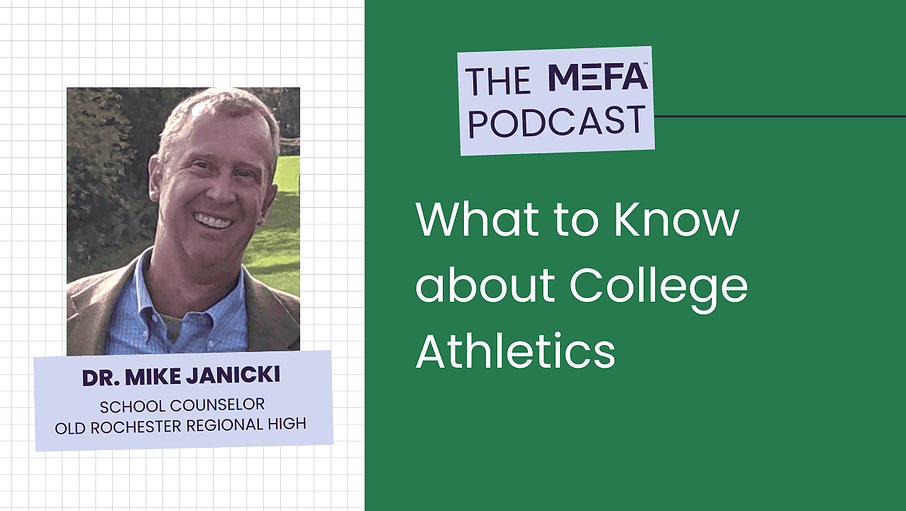

Resources Mentioned in this Episode
Jonathan Hughes: [00:00:00] Hello everyone and welcome to the MEFA Podcast. My name is Jonathan Hughes.
Julie Shields-Rutyna: And I’m Julie Shields-Rutyna.
Jonathan Hughes: And we have a great show for you today. Before we get started with anything though, I do have to, I said I would give a shout out. I gotta give a shout out to, to our listeners, Asher and Malcolm. Consider yourself shouted out. Thanks for listening to the show. We hope you continue to enjoy it. Now, moving on. We have on our show today. MEFA presenter, high school counselor, Mike Janicki, and if you have a student athlete, you’re going to want to check this out. So he is going to talk about athletics and college admissions, which is a whole world that I was really unaware of.
A big one too. A big part of this process for a lot of kids, and I didn’t really know much about it. So he’s going to talk all about athletics and college [00:01:00] admissions. He’s going to talk about like the different NCAA division schools. What you need to do if you’re a high school athlete who wants to play college sports, he’s going to touch on athletic scholarships, all that good stuff. So stick around for that. He’s a great guest. But first, what are we going to discuss, Julie?
Julie Shields-Rutyna: Yes. Well, we’re going to talk about another aspect of college admissions. We’ve, you know, the admissions process really gears up for Juniors. So these days we’re trying to share a lot about everything that Juniors can be doing.
And one of the most fun parts about the Admissions process, I think is college visits. So we’ll break down some good ideas for students thinking about their college visit.
Jonathan Hughes: Okay. So when we think about students visiting their prospective colleges what is the grade level? Are we thinking? Are we thinking of Juniors?
Julie Shields-Rutyna: Well, even younger students, Sophomores, Freshmen, or even younger, can always make an informal visit and drop by a [00:02:00] campus. Obviously younger kids with their parents, but you know, that’s the nice thing about college campuses. They’re usually nice places to walk around and they have. Sporting events and theatrical performances, concerts, readings.
So in a way it’s nice for students who are even younger to get a sense of all that at an, at an early age. But then once a student gets to be in Junior year of high school, things get a little bit more serious about the process of Admissions and you know, their counselors start talking about standardized tests and getting recommendations from teachers, and so then that’s a good time for students to think about planning a formal or some formal college visits.
Jonathan Hughes: Okay, so what is, what does that mean, formal?
Julie Shields-Rutyna: Yeah. Well, you know, we like to think of informal and informal. So informal is the type of visit that I was mentioning earlier where at any time, you know, students can just. Walk [00:03:00] onto a college campus, like, you know, an un unannounced drop in anyone can visit.
Now. You can’t just walk and sit in on a class, but you still can explore the campus. Maybe going to the student union, going to the dining hall. Maybe it’s a good way to get. I don’t know, feel for the culture, see what the students are like, what are they talking about? What do they care about? Someone’s mentioned always looking at what the student newspaper, you know, is saying, or what’s up on the, on the bulletin boards.
So it’s kind of hard to put it in concrete terms, but, we’ve just heard from many students over the years that when they have had their heart set on attending a college, they visited the campus. And either knew it was, it felt right, or knew that it really wasn’t the place for them. So, it’s just, you know, and again, a nice way to solidify that, that feel of a college that you think you might like to attend from what [00:04:00] you’ve seen on the computer at home.
Jonathan Hughes: Hmm. And that’s the informal,
Julie Shields-Rutyna: But that’s the informal.
Jonathan Hughes: Okay. Yeah.
Julie Shields-Rutyna: So, and then a formal visit is that you arrange it ahead of time. So you go on the website of the college and you go to the admissions section of the website and you can sign up. And you, there are usually programs for students like campus tours, or, you know, information sessions.
There are even some programs that would allow a student to stay as an overnight. In the dorm with a current student and attend classes. But in general, the, the more popular one is just that there are ways a student can get on the campus. Listen to an information session and go on a tour, and then they walk around and they see all the facilities.
They get to go into maybe a classroom, see class sizes and all of the other amenities of a college. So this gives the student a chance to ask [00:05:00] questions. You know, usually they’re having that tour with the tour guide and it also allows them to demonstrate their interest in attending that college.
Jonathan Hughes: Yeah, let’s talk about demonstrated interest. You just mentioned it. Tell everyone what that is.
Julie Shields-Rutyna: Yeah, well, college has received so many applications these days, especially, because with, with applications like the Common App it makes it easy for students to apply to more colleges and so sometimes these days, college doesn’t necessarily know just because they receive an application, how interested that that student is. So sometimes they will look at things like, did the student contact us? Did the student visit the campus? Did they attend an information center? Did they, did they do a tour? And that will let the college, feel that the student is interested and sometimes that can count in the admissions process.
Jonathan Hughes: Hmm. Okay. So that’s a good tip for [00:06:00] everybody. If there’s a college that you’re interested in, you’re going to apply to it. Make sure they know that you are interested. So, and a good way to do that is college tours. So what should people know about going on these college tours then?
Julie Shields-Rutyna: Yeah. Well, one thing I’ll say is that it. The tour sometimes depends on the size of the college. So, we have one of our colleagues, Meredith Clement, wrote a great blog on what to know about college visits and we can link to that hopefully in the show notes. And so I’ll say a couple of things that she said because she went very recently at smaller colleges.
They will probably show you every part of their campus. You can probably see the whole thing where bigger campuses probably. Highlights certain aspects, because maybe it would take too long for them to take, you know, groups of people around the entire campus. But in general, the tours typically run a few hours, so you’re probably going to spend a few [00:07:00] hours there when you get to campus, many times, as I mentioned, it’s the student, maybe who works in the admissions office, a current student who works in the admissions office who will, is taking you on the tour or could be someone who works in the admissions office and they’re going to walk with you from building to building. So one other tip that Meredith said is to wear comfortable.
Jonathan Hughes: And I feel like that’s a tip from Meredith’s own life, don’t you?
Julie Shields-Rutyna: Yeah. Exactly. And then, you know, I would say, as we mentioned, make sure that that the you’re, it’s recorded. It’s recorded that you attended the session and that you went on the tour, and that way if it is part of the admissions process, then the college will know you were there.
Jonathan Hughes: Aside from wearing comfortable shoes, what can students do to actually prepare for a visit like this.
Julie Shields-Rutyna: I would make sure that as a student you spend a little time prior to the visit thinking of some questions. So, you know, if you’ve looked at the college online, [00:08:00] you might want to just think about what questions you, you have and then to not be too afraid or too shy to ask them as they come up during the tour. Honestly, who are doing these tours they want your questions. They want to share, they want to tell about their experience as a student on that campus and you can learn, you can just learn so much from the answers to your questions.
Jonathan Hughes: You know, we, we’ve heard about the benefits. We just talked about the benefits of college visits, particularly in colleges that you’re really interested in. We hear from parents. I think that they can be a lot of fun, that they had great times with their kids on trips going to colleges, especially if it’s a long trip. But a lot of times, you know, it’s not really practical for students and families to visit every campus or a particular campus, that they’re interested in. So what if you can’t get there? What are some things that you can do?
Julie Shields-Rutyna: Well, definitely, I mean, the nice thing is that college admissions [00:09:00] offices now, because of the pandemic and the fact that everything had to move virtual for a couple of years, they, many of them have virtual. Tours right online that students can take and see all the different parts of the campus. They usually these days also have some virtual information sessions, and zoom appointments with people who work in the admissions office or with a student. So it’s, it’s really nice that there is that option so that students don’t feel like they have to visit, every college, but a student can call the admissions office and ask, there might even be, an alumnus in your local area that you could, you know, either meet or email and ask questions. So that could give you some additional information too. So call the admissions office, go on the admissions website and you can find all of the different ways to, to connect.
Jonathan Hughes: Is there [00:10:00] anything else we can let folks know about?
Julie Shields-Rutyna: I think one thing we didn’t say is that it is great if you can visit a campus while school is in session. I know you can’t always do that. Sometimes vacations in the summertime is, is a good time to visit and that’s fine. That’s good. And the admissions offices are, are set up to receive you then as well. But if you can visit when the classes are in session. You know, you get to see more students on the campus and you can sometimes get a better feel as well as maybe even see a class in session.
Jonathan Hughes: Thanks, Julie. Now it’s time to go to the MEFA Mailbag, and these are questions that have come into us over the past weeks and have been answered by our college planning team.
So remember, if you have any questions, you can email us [email protected]. You can call us at 1-800-449-MEFA. And you can reach us social media on Facebook that’s MEFAMa, on Twitter that’s [00:11:00] @MEFATweets and on Instagram it’s MEFA_MA. Our question today comes to us from Afton, who writes, I filed the FAFSA for my son on the ninth and the next day I saw a post for MEFA about the retirement savings not needing to be included. I think I messed up because I included the assets in my Roth IRA in the questions about current investments. Julie, what should Afton do?
Julie Shields-Rutyna: Yes, well, it is possible to go in and make a correction on the FAFSA so you can just log into your application. And then choose that you want to make a correction, not start a new FAFSA, and you can go in and make that change and then resubmit. And that change will get to your colleges within, you know, a day or so, so you can make that correction.
Jonathan Hughes: So that is a, that is of course. Some questions you can’t correct after you’ve, [00:12:00] filed them. Right? This one you can, what if you did answer a question wrong that you couldn’t correct. What would you do then?
Julie Shields-Rutyna: Then you would send a, an email, I think to all of the colleges that you’ve applied to, to just say, I made this error on my FAFSA, and I’d like to correct it and send that information directly to the colleges. You could send it to all of the colleges that you’ve applied to, or if you’re narrowing it down and getting close to making a decision, you could just send it to. That college. But, you know, financial aid administrators welcome any additional information that you have for them. So you should never feel like all is lost. You can always contact. The financial aid office.
Jonathan Hughes: I positioned you into that. I was afraid we were going to go through an episode without us getting in contact the financial aid office with any questions.
Julie Shields-Rutyna: As soon as I heard that question coming, I realized we were there again, [00:13:00] Jon.
Jonathan Hughes: Oh well. Alright, thanks Julie. One more time. If you have questions, you can email us [email protected]. You can call us at 1-800-449-MEFA. Our Facebook is MEFAMA, Twitter at @MEFATweets and InstagramMEFA_MA. So we have a bench of college guidance experts waiting to answer your question. Now let’s go to my talk on athletics and admissions with Mike Janicki.
Dr. Mike Janicki holds a doctorate in education for Northeastern University. He’s currently a school counselor at Old Rochester Regional High School and has spent time as a MEFA presenter. He’s held director positions at the high school level in both guidance and admissions, as well as a position that I will quiz him on in just with the NFL.
All of these element. Blend perfectly, of course, with what we’re going to talk about today, which is Dr. Janicki presentation for MEFA Athletics and College Admissions. So, Mike, welcome to the show.
Mike Janicki: Thank you. This is great to be here.
Jonathan Hughes: [00:14:00] You know, I said I was going to quiz you on that NFL position. I was looking over your, resume, so to speak to for that intro, what’s that?
Mike Janicki: So every, I mean, for the NFL, for every, actually every major sport league, there’s a, stat booth and I just simply work in the stat booth. So I’m assigned to Gillette Stadium, for all the home Patriot games. And, there’s a team of us. and pretty much, pretty much anything that you can imagine that’s counted is counted.
So the AP stats teacher always, enjoys Monday when I bring home, bring, bring to school the book of, the final stats from every game. But are you, it’s, it’s amazing.
Jonathan Hughes: You’ve been doing that for a while too, so it must be, it must be something that you enjoy. Yeah.
Mike Janicki: Yeah. I mean, I’ve always been interested in, in athletics. It is just been a part of who I’ve been growing up my entire [00:15:00] life. So anything that I can do to, keep my feet wet, whether it’s, college athletics, high school athletics, I coach the cross country team, here at the junior high. Have, you know, coached softball at the college level. Just dabbled a little. Athletic, academic advisor for student athletes at PC for a little bit. So I’ve always, it’s always been something I’ve been drawn to and now even with my own kids who, sports management majors, you know, both, division two club athletes at Division one, just my own kids are, so it’s kind of fun to, fun stuff to do.
Jonathan Hughes: Well, I’m glad you mentioned that because, so as I was saying to you earlier, I love this presentation. I love this topic. We’re going to post a link to the presentation, the recorded presentation in the notes to the show so that if people want to hear more of what you have to say, cause we’re going to go over it, but not certainly in the detail that you do in the presentation, but it’s something that I hadn’t really considered too much of.
A lot of kids have to deal with these [00:16:00] questions, a huge part of this process. Right. And you mentioned just a minute ago, division one, division two, I know the NCAA, of course. I think everybody has heard of the NCAA. So could you introduce right, those leagues and tell me a little bit.
Mike Janicki: So there are, there are three major governing bodies NCAA being the one that everyone’s familiar with, you know, Big 10 football, SEC football, March Madness, that’s all NCAA governing body and then there’s also, the NCIA, which is the National Association of Intercollegiate Athletics, and the National Junior College Athletic Association. Obviously the largest one with, you know, hundreds, almost a thousand member schools is the NCAA more popular. The NAIA is a little bit more popular. The schools are more prevalent geographically around the, in the Great Lakes region, Midwest, they’re [00:17:00] having been from Massachusetts there’s not a whole lot of student athletes. But there are, I have, I’m aware of a few students that I personally know that have gone out west for soccer, women’s soccer, cross country.
So it’s just worth, it’s certainly worth mentioning, you know, geographically here in Massachusetts and then the National Junior College Athletic Association. Kind of the two year schools of community colleges, that certainly is a stepping stone both academically and athletically, for many students who have aspirations to go onto a four year to play at a four-year school.
Jonathan Hughes: Sticking with the NCAA, and as you said, the, that’s sort of the largest and most well-known. You mentioned division one, division two. Take me through the different divisions of what that means.
Mike Janicki: Division one, two, and three really is how the school, how the university is appropriating effort towards their, maybe that’s not the right word, but [00:18:00] appropriating actions towards their athletics department. Be it money, be it facilities. You know, we all know, again, harping back to March Madness and the bowl system football, bowl system, you know, those are your larger, clearly your larger, athletic facilities and, and programs and then division two is going to be more, a little bit more regional in competition.
You know, division one conferences, you know, will be. Virtually coast to coast in some cases. You know, the Big 10 really does stretch from coast to coast. Big East is about to stretch from coast to coast, but so your division two will be certainly a little bit more, more regional and division three is going to be a smaller effort economically, towards, some of the facilities. You know, just the effort and, and time involved, but, one thing to get for student students to be thinking about is don’t get hung [00:19:00] up on that. Division one is the most prominent. There are division two schools with facilities that are substantial. I mean, just absolutely beautiful. You know where my son is now, you know, they’re winning national titles.
Their student athletes are getting drafted into, you know, major league baseball. You know, just substantial facilities and the top quality athletes at the division two level where they would certainly be very competitive and, and stronger competition than some division one schools. So the prominent don’t get caught up on the prominence of one, two or three. Really you’re looking for the, where you’re going to be the best student athlete that you can be.
Jonathan Hughes: Another thing that you talked about that I thought was, again, such a big thing that I hadn’t even thought of is really what the experience of being a division one athlete is like for these kids. And can [00:20:00] you go through that a little bit?
Mike Janicki: Think of it as a full-time job. It really in, in year round. Year round, the hours. It’s not, you know, what we see on TV is just the, you know, the two-hour game that we’re watching. But these are student athletes that, especially at the division one level, it really is a full-time job, between practice and film sessions and meetings in season, out of season.
Division two, a little bit less, little bit less, little bit more than a part-time job, but not quite the, the hours that, division one would be expecting. And again, don’t forget, I mean there are some, some powerhouse Division two programs that are going to be expecting a lot and Division three is.
So a little bit closer to the high school experience, so to speak, higher demand than what you would, what you experience in high school. But there’s a little bit more of a difference between [00:21:00] in season and out of season, expectations that, that they would have from division one or two student.
Jonathan Hughes: So you mentioned student athletes and this is the point that you make over and over again in your presentation, and I think it, it fits in well here with as far as the expectations are concerned. Can you talk about student athletes and, you know, said that the emphasis is on student athletes?
Mike Janicki: Yeah. It’s always a student athlete every. Every coach, every athletic director everybody involved in this realm it’s a student athlete for a very good reason. You’re, you are a student first. You’re there, you are at a college, you’re at a university. For one reason only, and that is to earn your degree. You’re not even eligible unless you make the grades in high school.
You know, you’re no good to your team, you’re no good to your coach if you are not making the grade in class. That is first and foremost the absolute expectation. Athletic departments will have, [00:22:00] academic advisors, they will have mandatory study hall, all for the specific purpose that you are a student first.
Jonathan Hughes: When I hear about. student athletes. And when I get questions about student athletes has been me at MEFA, it’s to do with scholarships, right? And, and so students expecting academic, athletic scholarships rather. Can you just think of people, an idea who maybe, you know, they, they’re high school athletes or have high school athletes and are thinking about scholarships, how prevalent athletic scholarships?
Mike Janicki: Few and far between, about only about 2% of high school, athletes, student athletes will receive an athletic scholarship. And even then, it’s not even across the board in every sport, it’s really just focused on, most of your full rides. You know, when we talk scholarships, we have this mind of a full ride scholar.
It’s mostly going to be basketball and [00:23:00] football. Of all the sports, those are primarily where, where all the scholarship money goes. Athletic scholarships are really only available at the division one and two level. Hmm. Division three student athletes, will not be able to be offered an athletic scholarship, but they may be some merit scholarship money for other purposes, that you know that, that they might be able to work with you a little bit or you might be able to work with them a little bit. And that, and also not every division one school offers athletic scholarships. Not division two, you know, division two. Just because the division one and two can doesn’t mean they do.
You know, the Ivy League is you know, that’s, there are no athletic scholarships. And, you know, that’s, that’s the practice, that’s, that’s the way this school operates.
Jonathan Hughes: Thinking about this in the perspective of a, a student or a, you know, parents with an athlete [00:24:00] in high school, you know, they, they want to play in college. Whatever it is that they play, they’re interested in these things. What, when should they start, you know, doing what they need to do and what is it that they need to start doing?
Mike Janicki: Right, so the first, this is always a, like, this is always a tricky point because first thing you have to do is really have a recognition of how talent.
The student really is, there are, you know, I’ve, I’ve, I’ve been on a lot of sidelines with parents talking and, and bragging of, you know, what the plans are, what, what the thoughts are, not the plans, what the thoughts are, what the hopes are, and there’s, you have to have an honest conversation. Yourself, with your coach, with, [00:25:00] with reality of how talented somebody really is.
If you are substantially talent, if, if your ri, if your talent level is rising to that level, of, you know, really being strongly recruited, you’re going to really, the process is going to start pretty early, and getting earlier and earlier. You may, if you’re really that good, you know, you may have people reaching out to you as early as you know, seventh, eighth grade.
You know, wow. It is, it’s pretty interesting, some of that. But the first thing you’ll need to do, one, again, going back to the student piece, is make the grade, the phrase really is 2.3 or take a knee. You need to have a minimum GPA of a 2.3 to be academically eligible to play at the division level and then [00:26:00] to be, to start getting on Coach’s list to be able to be contacted is you’ll need to register with the NCAA Eligibility Center. And you can do that as early as freshman or sophomore year. So the eligibility center’s going to have three different kind of levels. One will be just registration and just academic, certification, and then the other two will be a little bit more involved certifying amateurism.
As soon as you register, you’ll be given an NCAA ID number and then. If coaches reach out to you, or if you are reaching out to coaches, you’ll want to share that ID number so that coaches can add you to their interest list and they’ll use that as a means to when you register, you’ll, your high school receive a request to upload your transcript, so they can check your academics.
But the coach [00:27:00] the university will use that ID number to add you to their list to confirm eligibility kind of, to kind of a nuts and bolts housekeeping behind the scenes of, of keeping track of, you know, who’s talking to whom and, and when.
Jonathan Hughes: So a student gets to high school, they want to be. You know, looked at, by coaches or, or be able to be contacted or to contact coaches. How do they find that eligibility? That registration center?
Mike Janicki: Yeah, just Google eligibility center, NCAA eligibility. And it’ll, ask you to create a, okay. Create an ID, you know, that first level I, there’s no charge for that first level. The second level is mostly for international students, which third level will be more for division one, two caliber athletes.
Jonathan Hughes: And so since we talk about, coaches right? So coaches can contact people, people can contact coaches Yeah. Can you talk about [00:28:00] their role in this process?
Mike Janicki: Again, depending on your sport, depending on the division of where you’re. You know, where you’re looking. There will be established calendars of throughout the year of contact periods, no contact periods times of the year when you can have an official visit, when they’re not allowed. All of which is governed. Again, we’re talking NCAA. All of which can be found if you, you know, do a Google search of, NCAA contact calendars. It will lay out each, each sports calendar and when coaches can contact you. And a contact really is anytime a coach says more than hello to you, anything more than hello is considered a contact. An official visit is any time. That the school pays [00:29:00] for transportation or visit costs for you an unofficial visit is when it’s on, on your dime, when your visiting campus on your, your own expense an evaluation period is any time that a coach is observing you practice or play.
So as far as being in touch with coaches or coaches being in touch with you, you know, a lot of, a lot of in most cases, you know, people are participating in these showcases or tournaments. You know, people, student athletes have huddle accounts where they’re, uploading film, game film practice, film coaches, traveling a country to watch recruits is difficult.
So the, those online, forums can be, can be helpful and the, you know, those tournaments and showcases can be helpful where a coach can watch, you know, hundreds of people [00:30:00] on the, on various fields all around, rather than looking for one diamond in the rough kind of thing.
Jonathan Hughes: Is it more common for, contacts be initiated by the by coaches or by students?
Mike Janicki: It, again, it really comes down to how good you really are. You know if, you are a standout athlete, and I mean, we’re talking the standout. You know, Sports Illustrated used to have that thing faced in the crowd. You know, where people are getting noticed and those, that top caliber student athlete will be found.
Coaches will reach out to them, you know, if you are, you know, if you. Not rising to that level. You know, a, a u showcases, you know, club teams will often participate in tournaments, that coaches will attend, and they’ll see, [00:31:00] they’ll see, they’re watching the game, they’ll see the talent, they’ll do their evaluation and.
Coaches will reach out, to, to, because they’ll have a roster of all the participants and they’ll reach out to the students that they’re interested in speaking with more often. You know, if you are a situation, this is in my own family, my own son was, you know, interested in playing at the division two level. You know, wasn’t being actively recruit. and, but he took the initiative, which really does carry a lot of weight. It shows the coach responsibilities, maturity, ownership. But if you are interested in a specific school, you want to attend a specific school, you know, feel free to reach out to this, to the coach.
Nothing too elaborate. You know, name, height, weight, sport, position, played, names, contacts of your high school, [00:32:00] you know, club coaches, and, you know, GPA certainly, you know, share with that. If you have already registered with the NCAA, share your ID number, and you know, keep your fingers crossed.
Jonathan Hughes: What are the type of things that students have to be mindful of student athletes have to be mindful of in order to maintain their eligibility? And then, you know, is there, what resources can they consult with help for this?
Mike Janicki: So different schools will be, will have different, systems in place. You know, they will pretty much all have.
For the most part, all have, academic advisors, for student athletes, tutoring centers, study halls you know, of one form or system or another. You know, available for student athletes because, you know, especially at some of those larger schools, division one schools, you’re also dealing with travel, you know, long, in some cases long distance travel.
[00:33:00] The expectation is that you maintain grades on campus. You’re no good, I think I said this earlier, you’re no good to coach. You’re no good to your teammates if you are, not eligible to play because you didn’t make the grades. Now
Jonathan Hughes: I want to and really by talking about some advice for the students, for the student athletes and you talked about fit. In your presentation. That’s something that we talk about in general, but I think it, it takes on a, a specific or a special sort of consideration when we’re talking about student athletes with all of their responsibilities. So what would you advise students when they’re sort of looking around and making a gut check.
Mike Janicki: Right. It, I mean, I totally agree. I mean, we’re always talking about fit for, for any student look when they’re looking at school, at college. But fit in this sense for the student athlete really does take on a next level, level of importance [00:34:00] because you are talking. You’re, you’re not just going to a university, but you’re joining a team and, you know, what is the fit there? You know, are you gonna be comfortable working with that coach? What is there- what is the prospect of making, you know, not just making the team, but actually playing in competition? If you are, if you’re a point guard coming in as a freshman, and there’s already. Three freshman point guards, two sophomore point guards, you know, they’re stacked at the point guard position.
What is your expectation of seeing the, seeing the court anytime soon? You know, what is the expectation out of season? Oftentimes, you know, the coaches will put on camps, you know, youth camps, which is probably where you got it, seen in the first place. Could be, you know, but what is your expectation there?
[00:35:00] You know, what, what is, what major are you interested in? You know, if somebody who’s interested in, you know, nursing, engineering, architecture, something that’s a really substantial. Academically demanding major. Are you going to be able to balance the academics as well as, you know, the, the athletic season?
You know, depending on the, you know, your season, you know, what is, we’re coming up on the holiday break, you know, if you’re playing basketball, you know, are you going to be able to even come home during break? You know, what’s your, what’s your academic course load during the academic year, and are you going to have to come back over the summer to take additional classes to, to stay caught up?
You know, so, so all of that really plays into the concept of fit. And can you, Are you going to be comfortable being a student athlete in that program on [00:36:00] that campus? You know, and even, are you going to be comfortable being a student athlete? Maybe just want to be a student, you know, being a student athlete really is, it, it’s a valuable experience.
It really is. It, it demonstrates, a high level of responsibility of maturity, of expectation that you have of yourself, of your team. And it, it can play a big role. After college experiences but you have to be comfortable going into it, you know, know, know what’s expected of you.
Jonathan Hughes: This is, as I said, a whole side of things that I never really thought of before. Whenever I would think of, you know, college athletes or student athletes are certainly having at the level where they’re getting scholarships, I would think of them primarily in terms of their, their talent or their luck and, and, you know, they’re so lucky to be so talented, but really, it, you know, I wasn’t thinking about the workload and, you know, the full-time job [00:37:00] aspect of it and the sacrifices that that they would’ve to make.
Mike Janicki: It’s kind of next level expectation, you know, you know, but when you reach the college level, you know, for the coach, that’s their job is to be the coach. You know, the expectations placed on a college coach is different, and so their expectations on their student athletes is, is substantial as well. You know, so it’s there’s a lot more involved than, than what, what they’re exper- what student athletes are experiencing before they get to college. So it’s, it’s a, it’s a fun and exciting and, and rewarding, time. But just, you know, kind of know what you’re getting into, and, and look forward to it.
Jonathan Hughes: Well, Mike, thank you so much. It was a pleasure to have you on and hopefully, you know, we can do this again.
Mike Janicki: You bet. No, this is good. This is fun. Thank you.
Jonathan Hughes: All right, folks, well, that about wraps it up. I want to thank Mike Janicki once again for teaching us all about athletics and admissions.
And folks, if you liked what you heard today and you want to know [00:38:00] more about planning, saving, and paying for college and career readiness, you can follow us on Apple Podcast, Spotify, Stitcher, wherever you get your podcasts. And please remember two. It helps us to keep doing what we are doing and getting this show out to folks like you. Julie, thank you again. It was a pleasure.
Julie Shields-Rutyna: Thank you.
Jonathan Hughes: I want to thank Shaun Connolly, our producer and AJ Yee for his assistance in posting the show. Once again, my name is Jonathan Hughes and this has been the MEFA Podcast. Thanks.










